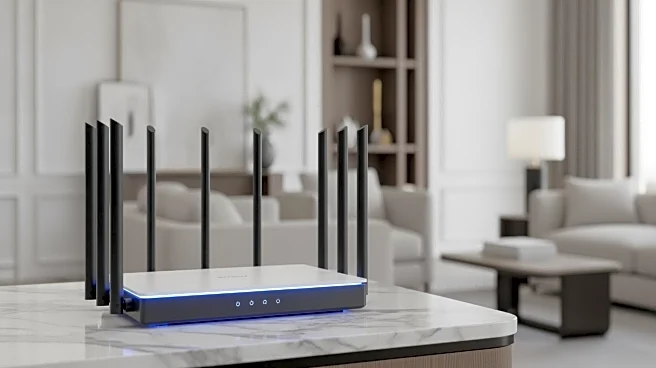What's Happening?
TP-Link's Deco BE68 BE14000 is a high-performance home mesh system designed to provide extensive Wi-Fi 7 coverage. The system, available as a two or three-pack, offers up to 8,100 square feet of coverage with three nodes, making it suitable for large
properties. The Deco BE68 operates over three bands (2.4, 5.0, and 6.0 GHz) with a maximum speed rating of BE14000, ensuring fast data transfer rates. The system is priced at $700 for a three-pack, which is competitive compared to other high-end Wi-Fi 7 routers. The Deco BE68 is noted for its ease of use, stylish design, and ability to deliver fast wireless connectivity throughout a home.
Why It's Important?
The introduction of the TP-Link Deco BE68 BE14000 highlights the growing demand for advanced home networking solutions that can support high-speed internet connections and multiple devices. As more households require reliable and fast Wi-Fi for streaming, gaming, and remote work, mesh systems like the Deco BE68 become essential. This development reflects the broader trend towards smarter home environments, where seamless connectivity is crucial. The system's ability to cover large areas makes it particularly appealing to homeowners with expansive properties, ensuring consistent internet access across all rooms.
What's Next?
As Wi-Fi 7 technology becomes more prevalent, consumers can expect further advancements in home networking systems, potentially offering even faster speeds and greater coverage. TP-Link's continued innovation in this space may lead to new products that cater to specific consumer needs, such as enhanced security features or integration with smart home devices. The market availability of the Deco BE68 may expand beyond the U.S., providing more options for international consumers seeking high-speed mesh systems.
Beyond the Headlines
The reliance on a phone app for setup and management, rather than a web browser, may signal a shift in how consumers interact with networking devices, emphasizing mobile convenience. However, this approach could alienate traditional users who prefer desktop management. Additionally, the system's subscription services for advanced features raise questions about the long-term cost of ownership and the balance between upfront investment and ongoing expenses.















